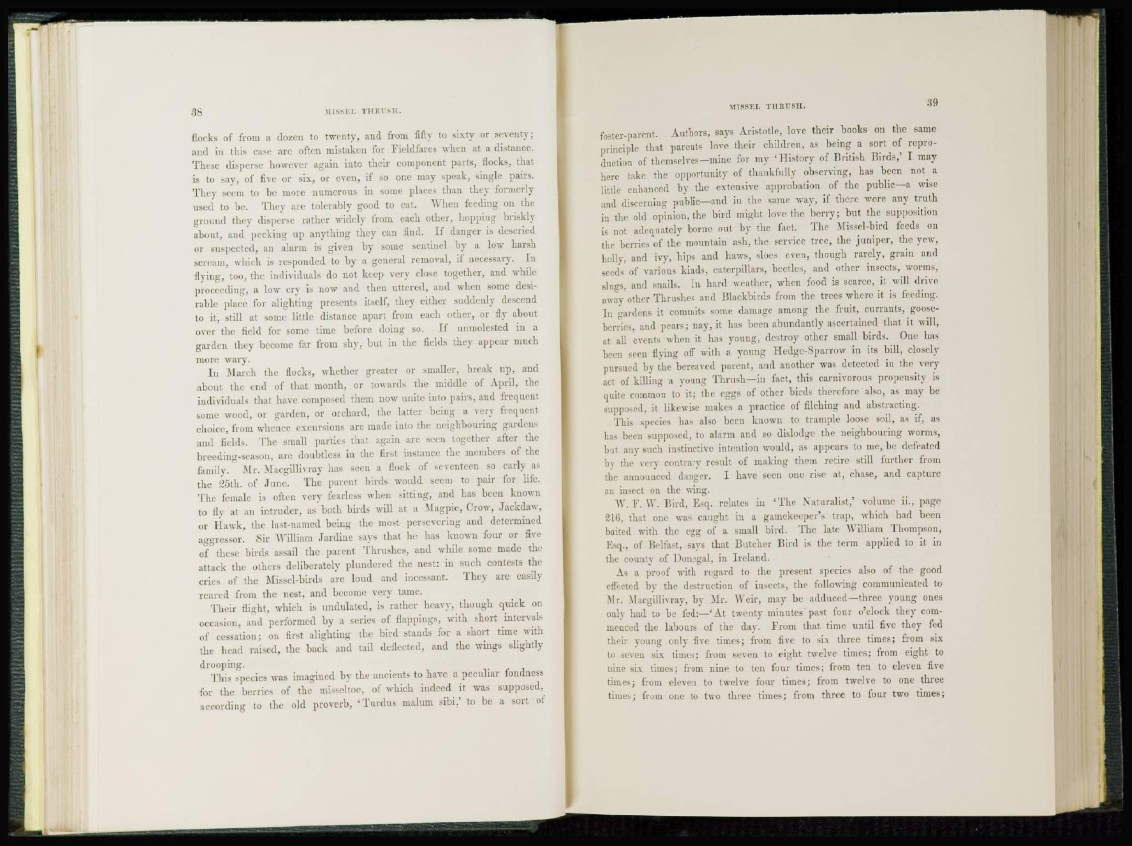
88 MISSEL THRUSH.
flocks of from a dozen to twenty, and from fifty to sixty or seventy;
and in this case are often mistaken for Fieldfares when at a distance.
These disperse however again into their component parts, flocks, that
is to say, of five or six, or even, if so one may speak, single pairs.
They seem to be more numerous iu some places than they formerly
used to be. They are tolerably good to eat. When feeding on the
ground they disperse rather widely from each other, hopping briskly
about, and pecking up anything they can find. If danger is descried
or suspected, an alarm is given by some sentinel hy a low harsh
scream, which is responded to by a general removal, ¡1' necessary. In
flying, too, the individuals do not keep very close together, and while
proceeding, a low cry is now and then uttered, and when some desirable
place for alighting presents itself, they cither suddenly descend
to it, still at some little distance apart from each other, or fly about
over the field for some time before doing so. If unmolested in a
garden they become far from shy, but in the fields they appear much
more wary.
In March the flocks, whether greater or smaller, break up, and
about the end of that month, or towards the middle of April, the
individuals that have composed them now unite into pairs, and frequent
some wood, or garden, or orchard, the latter being a very frequent
choice, from whence excursions are made into the neighbouring gardens
and fields. The small parties that again arc seen together after the
breeding-season, arc doubtless in the first instance the members of the
family. Mr. Macgillivray lias seen a floci of seventeen so early a--
the 25th. of June. The parent birds would seem to pair for life.
Tin1 female is often very fearless when sitting, and has been known
to fly at an intruder, as both birds will at a Magpie, Crow, Jackdaw,
or Hawk, the last-named being the most persevering ami determined
aggressor. .Sir William Jardine says that he has known four or five
of these birds assail the parent Thrushes, and while some made the
attack the others deliberately plundered the nest: in such contests the
cries of the Missel-birds are loud and hieessant. They are easily
reared from the nest, and become very tame.
Their flight, which is undulated, is rather heavy, though quick on
occasion, and performed by a series of flappings, with short intervals
of cessation; on first alighting the bird stands for a short time with
the head raised, the back and tail deflected, and the wings slightly
drooping.
This species was imagined by the ancients to have a peculiar fondness
for the berries of the misseltoc, of which indeed it was supposed,
according to the old proverb, ' T a r d u s malum sibi,' to be a sort ot
MISSEL TUKUSH.
fo«tcr-parent. Authors, says Aristotle, love their books on the same
principle that parents love their children, as being a sort of reproduction
of themselves—mine for my 'History of British Birds,' I may
here take the opportunity of thankfully observing, has been not a
little enhanced by the extensive approbation of the public—a wise
and discerning public—and in the same way, if there were any truth
in the old opinion, the bird might love the berry; but the supposition
is not adequately borne out by the fact. The Missel-bird feeds on
flic berries el' the mountain ash, the service tree, the juniper, the yew,
holly, and ivy, hips and haws, sloes even, though rarely, grain and
seeds of various kinds, caterpillars, beetles, and other insects, worms,
slugs, and snails. In hard weather, when food is scarce, it will drive
away other Thrushes and Blackbirds from the trees where it is feeding.
I n gardens it commits some damage among the fruit, currants, gooseberries,
and pears; nay, it has been abundantly ascertained that it will,
at all events when it has young, destroy other small birds. One has
been seen flying off with a young Hedge-Sparrow in its bill, closely
pursued by the bereaved parent, and another was delected in the very
act of killing a young Thrush—in fact, this carnivorous propensity is
quite common to it; the eggs of other birds therefore also, as may be
supposed, it likewise makes a practice of filching and abstracting.
This species has also becu known to trample loose soil, as if, as
has been supposed, to alarm and so dislodge the neighbouring worms,
but any such instinctive intention would, as appears to me, be defeated
by the very contrary result of making them retire still further from
the announced danger. I have seen one rise at, chase, and capture
an insect on the wing.
\\ . F. \\ . Bird, Esq. relates in 'The Naturalist,1 volume ii., page
210, that one was caught in a gamekeeper's trap, which had been
baited with the egg of a small bird. The late William Thompson,
Esq., of Belfast, says that Butcher Bird is the term applied to it in
the county of Donegal, in Ireland.
As a proof with regard to the present species also of the good
effected by the destruction of insects, the following communicated to
Mr. Macgillivray, by Mr. Weir, may be adduced—three young ones
only had to be fed:—'At twenty minutes'past four o'clock they commenced
the labours of the day. From that time until five they fed
their young only five times; from five to six three times; from six
to seven six times; from seven to eight twelve times; from eight to
nine six times; from nine to ten four times; from ten to eleven five
tunes; from eleven to twelve four times; from twelve to one three
times; from one to two three times; from three to four two times;